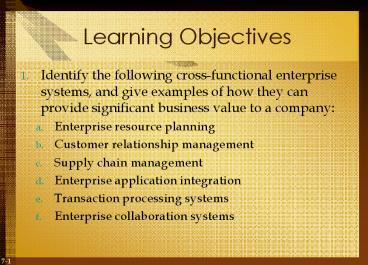Learning Objectives - PowerPoint PPT Presentation
1 / 19
Title:
Learning Objectives
Description:
Identify the following cross-functional enterprise systems, and give examples of ... Cross the boundaries of traditional ... Xbox demo. HP demo. 7-10. SCM goal ... – PowerPoint PPT presentation
Number of Views:47
Avg rating:3.0/5.0
Title: Learning Objectives
1
Learning Objectives
- Identify the following cross-functional
enterprise systems, and give examples of how they
can provide significant business value to a
company - Enterprise resource planning
- Customer relationship management
- Supply chain management
- Enterprise application integration
- Transaction processing systems
- Enterprise collaboration systems
2
Cross-functional Systems
- Cross the boundaries of traditional business
functions - In order to reengineer and improve vital business
processes all across the enterprise
3
How can Internet technologies improve a process
in one of the functions of business? Choose one
example and evaluate its business value.
- Team 1 Accounting
- Team 2 Finance
- Team 3 Production
- Team 4 Sales
- Team 5 Marketing
- Team 6 Human resources
4
How can Internet technologies be involved in
improving a process in one of the functions of
business? Choose one example and evaluate its
business value.
- Students answers will vary. However, it will be
relatively easy for them to choose from any of
the various functions of business such as
accounting, marketing, manufacturing, retailing,
etc. For this answer, the accounting function
will be given. For example, aaccounting
information systems are being affected by
Internet and client/server technologies. Using
the Internet, intranets, extranets, and other
network changes how accounting information
systems monitor and track business activity. The
online, interactive nature of such networks calls
for new forms of transaction documents,
procedures, and controls. Many companies are
using or developing network links to their
trading partners through the use of the Internet
or other networks for applications such as order
processing, inventory control, accounts
receivable, and accounts payable. These advances
in the accounting function have to vast
improvements in the capturing, reporting, and the
accuracy of company data. Thus, real-time
processing of accounting information enables
executives to make better and more informed
decisions involving their firms resources.
5
Enterprise Collaboration Systems (ECS)
- ECS
- Cross-functional IS that enhance communication,
coordination and collaboration among the members
of business teams and workgroups
6
ECS Goals
- Communicate share information with each other
- Coordinate coordinate individual work efforts
and use of resources with each other - Collaborate work together cooperatively on
joint projects and assignments
7
ECS Tools
8
ECS Demos
- Webex Demo
- Localize Content
9
Supply Chain Management (SCM)
- A cross-functional interenterprise system
- To help support and manage the links between a
companys key business processes - And those of its suppliers, customers and
business partners - Xbox demo
- HP demo
10
SCM goal
- Fast, efficient, low-cost network of business
relationships or supply chain to get a companys
products from concept to market - A supply chain
- Interrelationships with suppliers, customers,
distributors, and other businesses that are
needed to design, build and sell a product
11
SCM
12
Electronic Data Interchange (EDI)
- EDI
- The electronic exchange of business transactions
- Over the Internet and other networks
- Between supply chain trading partners
13
EDI Examples
14
Causes of problems in SCM
- Lack of proper demand-planning knowledge, tools
and guidelines - Inaccurate or overoptimistic demand forecasts
- Inaccurate production, inventory, and other data
- Lack of adequate collaboration within the company
and between partners - SCM software considered immature, incomplete and
hard to implement
15
CRM Applications Clusters
16
Customer Relationship Management (CRM)
- CRM uses technology to
- Create a cross-functional enterprise system
- That integrates and automates many of the
processes in sales, marketing and customer
service that interact with customers - Create a framework of web-enabled software and
databases that integrate these processes with the
rest of the companys processes - NetSuite demo
- Quotewerk demo
17
CRM supports customer life cycle
18
CRM benefits
- Identify and target best customers
- Real-time customization and personalization of
products and services - Track when a customer contacts a company
- Provide consistent customer experience and
superior service and support
19
Reasons for CRM failures
- Lack of understanding and preparation
- Rely on application to solve a problem without
first changing the business processes - Business stakeholders not participating and not
prepared































